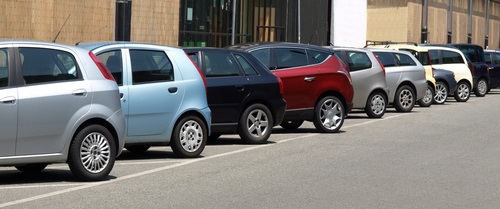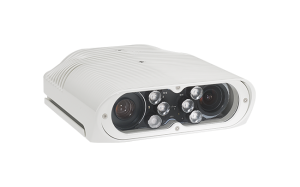Interview: The evolution of ALPR and Genetec's vision of parking enforcement
An interview with Chris Yigit from Genetec

Parking Network recently spoke with Chris Yigit, Genetec AutoVu Program Manager, about ALPR, enforcement and security. This is just some of the insight he shared with us about Genetec and ALPR.
In what ways has ALPR evolved in the last few years?
When we started doing this about 15 years ago, the main focus was much smaller in scale. It was still prevalent and still widespread but the ambitions of ALPR for parking were smaller. Because vehicles have a lot more connectivity now and the infrastructure is there now, it doesn’t matter where you go. A cellular connection is there. We are seeing now an explosion in ALPR and its potential applications because a vehicle is no longer autonomous. It can actually connect with the central database and pull information in real time.
I think this has changed the game. One of the things we have seen evolve is pay-by-plate with people using their meters, using their smart phones or even demanding more real-time performance from their permit vendors. Parking customers can now generate parking credentials in real time. This real-time information is put into a database, and ALPR vehicles can tap into that database or that hub and get all that information in real time. That makes the ALPR solution much more powerful.
In general, how effective is ALPR when comparing to traditional enforcement methods?
 There is the theoretical and practical aspect. There are crazy numbers that say an LPR system can scan up to 5,000 plates an hour but how much of that is practical? If you have to drive at high speeds to obtain those rates, it doesn’t really make that much practical scene. From a strictly pragmatic perspective, if you compare having an ALPR system to an agent on foot, we have documented cases that we go from 5 to 9 times more efficiency in terms of enforcement [with ALPR]. One of the challenges is that people associate ALPR with the large cities that can afford this technology and that is not the case. We have hundreds of systems installed, and the majority of them are actually smaller communities that have chosen to buy one system versus larger ones that have bought thirty. The smaller communities find that they can buy one system and they can still keep that officer, and they suddenly have an efficiency gain with this tool. It’s a force multiplier that allows them to cover much more area with the same amount of man power.
There is the theoretical and practical aspect. There are crazy numbers that say an LPR system can scan up to 5,000 plates an hour but how much of that is practical? If you have to drive at high speeds to obtain those rates, it doesn’t really make that much practical scene. From a strictly pragmatic perspective, if you compare having an ALPR system to an agent on foot, we have documented cases that we go from 5 to 9 times more efficiency in terms of enforcement [with ALPR]. One of the challenges is that people associate ALPR with the large cities that can afford this technology and that is not the case. We have hundreds of systems installed, and the majority of them are actually smaller communities that have chosen to buy one system versus larger ones that have bought thirty. The smaller communities find that they can buy one system and they can still keep that officer, and they suddenly have an efficiency gain with this tool. It’s a force multiplier that allows them to cover much more area with the same amount of man power.
In light of the recent data leaks, is license plate data collected by ALPR secured and how can parking agencies protect consumers' private data?
This is one of the biggest areas of focus that ALPR has seen and it is a very valid question. The reality is, depending on who you speak to, the information is public information because anybody can see the plate. Where it starts to get private is who does this plate belong to? Does it belong to this gentleman? Where does he live? That is the private information that you get from the department of motor vehicles. What is important is that we’ve created a back end that is very personalized. To a logical extent, if someone has a license plate that was read and hasn’t really done anything wrong, there is no reason to keep that data at all. However, if someone is found to be parking illegally or incorrectly, you may want to hang on to that for six months in case the person decides to contest that. You have that data locally but once that is done, you can purge it. I think having control of how long you keep that data, the variability to set it so it meets your local legal concern is key.
What do you see as the future of ALPR?
In terms of the technology itself, I think it is going to get more and more reliable. We have been doing this for 15 years and we are constantly evolving and trying to perform even better. I think the reliability will continue to grow. What we do with the data is going to define how things change. Going around and getting data, we are constantly realizing there is more and more value in the data. You go down a block somewhere and you realize you scan 30 cars and you know the capacity of that block is actually 40 cars. You can now pull out occupancy data, seeing the trends, when do these occupancies grow, when do they fall, knowing more where people tend to pay for parking and where your hit rate tends to be higher. A lot of this insight will help city officials and municipalities better manage their cities. Not only will ALPR become a more effective tool for parking enforcement, I think it will also contribute to providing metadata or big data. The beautiful part about license plate recognition is because it can be tied into an overall real time system, we talk about things like variable rates and variable parking rules, all of this can be controlled on the fly when you are using license plate recognition.
About Genetec
Genetec develops open-platform software, hardware and cloud-based services for the physical security and public safety industry. Its flagship product, Security Center, unifies IP-based video surveillance, access control and automatic license plate recognition (ALPR) into one platform. A global innovator since 1997, Genetec is headquartered in Montreal, Canada, and serves enterprise and government organizations via an integrated network of resellers, integrators and consultants in over 80 countries. Genetec was founded on the principle of innovation and remains at the forefront of emerging technologies that unify physical security systems. For more information about Genetec, visit: genetec.com






Comments
There are no comments yet for this item
Join the discussion